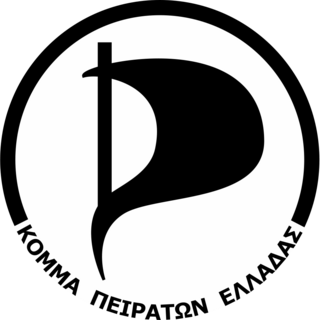Top Qs
Timeline
Chat
Perspective
Pirate Party of Greece
Political party in Greece From Wikipedia, the free encyclopedia
Remove ads
The Pirate Party of Greece (Greek: Κόμμα Πειρατών Ελλάδας) is a political party in Greece. Initially based on the model of the Swedish Pirate Party, it supports reform of copyright law, the abolition of patents, and respect for privacy. In recent years, it has expanded its scope to a broader range of policy topics, such as its support for a fully secular state, the adoption of universal basic income, its opposition to militarism, nationalism, colonialism, and its drive for the further democratization of the European Union.[2]
The party was founded on 14 January 2012. It was officially recognized on 10 February 2012, and had 480 members on that date.[3] At 2013 in its 2nd congress it was the only pirate party in Europe to reject Direct Democracy as a party's principle [4]. It was a full member of the Pirate Parties International[5] and the European Pirate Party until June 2025. In its 12th Congress unanimously decided to leave them, with unanimity being a clear sign of the lack of democratic procedures inside the party. The decision cited ideological issues, a lack of political added value, and a lack of room for "constructive and productive political discourse".[6]
Remove ads
History
Summarize
Perspective
May/June Legislative Elections 2012
In the 6 May 2012 Greek legislative election, the party managed to present candidates in 31 of the 56 constituencies and secured 0.51% (32,484) of the total votes.[7] Out of 32 parties, the Pirate Party came 19th. In the June 2012 election the party received 0.23% of the vote (14,169), coming 14th out of 21 parties.[8]
European Elections 2014
On 25 May 2014, the party participated in the 2014 European elections in a coalition with Ecologist Greens. The coalition received 0,90% (51.573) of the vote.[9] Noted that Ecologist Greens (standalone with no coalition and before their breakup in two separate parties) received in the May 2012 election 2,93% (185.366) of the vote, and in the June 2012 election 0.88% (54.420) of the vote. Their second half, Prasinoi participated separately in the European elections and received 0.50% (28,460 votes).
European Elections 2019
In May 2019, the party participated in the 2019 European elections in a coalition with Popular Unity.[10] The coalition received 0,56% (31.674) of the vote.[11]
2nd Congress of 2013
At 2013 in its 2nd congress it was the only pirate party in Europe to reject Direct Democracy as a party's principle [12].
11th Congress of 2023
In November 2023, the party's 11th Congress adopted new, more comprehensive, Statutes and decided to expand its scope by trying to address areas such as education, healthcare, public administration, and immigration.[13] In this Congress, marking a break from classic Pirate practice, it abolished the "not left, not center, not right" approach adopted by many other Pirate Parties, deeming it "neo-LePenist" and a backdoor for ideological and political derailment into the far-right.[14]
12th Congress of June 2025
On 1 June 2025, the 12th Congress of the party unanimously decided to furter expand and strengthen its Statutes,[15] affirming its alignment with the progressive parties of the political spectrum. It also unanimously decided to leave the European Pirate Party and the Pirate Parties International, with its resignation pointing to a deep ideological and moral schism. Finally, it decided to replace the Uppsala Declaration[16] with the Rethymno Declaration.[17] The Rethymno Declaration begins with a sharp criticism of the transnational and international Pirate institutions (PPEU and PPI) for their inaction and silence on serious incidents of backslide in Press freedom, erosion of democracy and the rule of Law, and lack of government accountability in Greece, the Gaza genocide, as well as procedural abuses by the leaderships of the PPEU and PPI to prevent any actual political discourse. Then, it presents what the party views as the "seven plagues" of the Pirate Movement, before proceeding to make the case for an independent and radical Pirate Movement and set out eight axes of political mobilization:
- Human-Civil-Social Rights
- Strengthening of Democracy and the Rule of Law – Improvement of Public Administration
- Economic/Financial, Social, Gender, and Environmental Justice – Protection of Social Goods
- Free and Equitable Access to Education for All
- Digital, Intellectual, and Communication Rights
- A New Economic Model
- Active, Practical Opposition to Nationalism, Imperialism, and Militarism
- The European Vision of the New Pirate Movement
Remove ads
Election results
Hellenic Parliament
- Run as part of the Green & Purple coalition.
Remove ads
References
External links
Wikiwand - on
Seamless Wikipedia browsing. On steroids.
Remove ads

